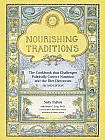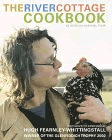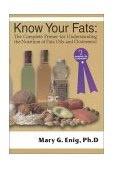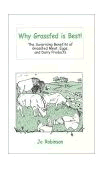|
Nourishing Traditions: The Cookbook that Challenges Politically Correct
Nutrition and the Diet Dictocrats
by Sally Fallon, Mary G. Enig PhD.
 Your body needs old-fashioned animal fats. New-fangled polyunsaturated
oils can be bad for you. Modern whole grain products can cause health problems.
Traditional sauces promote digestion and assimilation. Modern food processing
denatures our foods but Ancient preservation methods actually increase
nutrients in fruits, nuts vegetables, meats and milk products! Your body needs old-fashioned animal fats. New-fangled polyunsaturated
oils can be bad for you. Modern whole grain products can cause health problems.
Traditional sauces promote digestion and assimilation. Modern food processing
denatures our foods but Ancient preservation methods actually increase
nutrients in fruits, nuts vegetables, meats and milk products!
Recalling the culinary customs of our ancestors, and looking ahead to
a future of robust good health for young and old, Nourishing Traditions
offers modern families a fascinating guide to wise food choices and proper
preparation techniques. Sally Fallon unites the wisdom of the ancients
with the latest independent and accurate scientific research in over 700
delicious recipes that will please both exacting gourmets and busy parents.
Highly recommended.
The Great Food Gamble
John Humphrys
 As
readers of Devil's Advocate and listeners to Radio 4's Today programme
will no doubt expect, Humphrys has a no-nonsense approach. He has little
time or patience with mealy-mouthed politicking. Industrial practices,
backed up by political will, is costing our health and our environment
too dear, he argues. He counts the cost of intensive factory farming,
not only in terms of the destruction of our rural heritage, long-term
environmental
effects and mounting health concerns about the use of antibiotics and
pesticides, but the hard cash cost of subsidies and cleaning up pollution
that put
the lie to the food industry's claim of providing "cheap" food. As
readers of Devil's Advocate and listeners to Radio 4's Today programme
will no doubt expect, Humphrys has a no-nonsense approach. He has little
time or patience with mealy-mouthed politicking. Industrial practices,
backed up by political will, is costing our health and our environment
too dear, he argues. He counts the cost of intensive factory farming,
not only in terms of the destruction of our rural heritage, long-term
environmental
effects and mounting health concerns about the use of antibiotics and
pesticides, but the hard cash cost of subsidies and cleaning up pollution
that put
the lie to the food industry's claim of providing "cheap" food.
Read an excerpt.
Highly recommended.
The River Cottage Cookbook
Hugh Fearnley-Whittingstall, Simon Wheeler (Photographer)
 Although
it calls itself a cookbook and does contain a large number of fine recipes, the book's scope is much broader. Really, this is more like
one of those "Enquire Within on Everything" volumes 19th-century
settlers used to take to the outback with them. Starting with
vegetables, proceeding to livestock and fish and concluding with the
wild food, floral and faunal, of the hedgerow, Hugh Fearnley-Whittingstall
explains how he grows, gathers, kills and cooks his own food. This is not just how to roast a chicken; this is what breed of chickens should you
keep, how to look after them and keep them happy and healthy, how to slaughter them as well as how to cook them. Although
it calls itself a cookbook and does contain a large number of fine recipes, the book's scope is much broader. Really, this is more like
one of those "Enquire Within on Everything" volumes 19th-century
settlers used to take to the outback with them. Starting with
vegetables, proceeding to livestock and fish and concluding with the
wild food, floral and faunal, of the hedgerow, Hugh Fearnley-Whittingstall
explains how he grows, gathers, kills and cooks his own food. This is not just how to roast a chicken; this is what breed of chickens should you
keep, how to look after them and keep them happy and healthy, how to slaughter them as well as how to cook them.
There is a lot of information here, and a lot of hard reality, too: he
is very clear and forthright about the place of death in this kind of life.
But then this is a very clear and forthright book overall, a very engaging
and really quite inspirational manual of how to live the country life so
many of us dream about. Fabulous recipes too!
Highly recommended.
Nutrition and Physical Degeneration
Weston A. Price DDS
 This
is one of the great classics of nutrition, and deserves a wide audience. Dr. Price traveled to various isolated parts of the globe in the 1930's, to
study the health of populations that had no contact with "civilization". He saw
first hand how whole unprocessed foods, locally grown and traditionally prepared, promoted health, and refined foods and synthetic farming methods
destroyed it. His extraordinary photographs clearly show the difference in facial structure between populations eating their traditional diets
and those who had moved onto a a processed
modern diet. This book
should
be in every nutrition
library and be read by everyone who values their health. This
is one of the great classics of nutrition, and deserves a wide audience. Dr. Price traveled to various isolated parts of the globe in the 1930's, to
study the health of populations that had no contact with "civilization". He saw
first hand how whole unprocessed foods, locally grown and traditionally prepared, promoted health, and refined foods and synthetic farming methods
destroyed it. His extraordinary photographs clearly show the difference in facial structure between populations eating their traditional diets
and those who had moved onto a a processed
modern diet. This book
should
be in every nutrition
library and be read by everyone who values their health.
The Diet Cure
Julia Ross
 The
Diet Cure is an amazing book, filled with wisdom, experience, and practical advice. Nutrients, amino acids, and dietary interventions will become a much
larger part of what physicians use in the twenty-first century. This book will help lead the way. The
Diet Cure is an amazing book, filled with wisdom, experience, and practical advice. Nutrients, amino acids, and dietary interventions will become a much
larger part of what physicians use in the twenty-first century. This book will help lead the way.
Written by a veteran in the field of eating disorders addiction, this fast, personalized body repair manual for weight loss, mood balance, and energy
offers a new way to stop food cravings and cure mood swings.
Know Your Fats : The Complete Primer for Understanding the Nutrition of Fats, Oils and Cholesterol
by Mary G. Enig
 This book, written by one of the world’s leading lipid biochemists, is a much needed title in today’s “fat-phobic” world.
Discarding politically correct notions that saturated fats are unhealthy, Dr. Mary Enig presents a thorough, in-depth and understandable look at
the world of lipids. This book, written by one of the world’s leading lipid biochemists, is a much needed title in today’s “fat-phobic” world.
Discarding politically correct notions that saturated fats are unhealthy, Dr. Mary Enig presents a thorough, in-depth and understandable look at
the world of lipids.
Know Your Fats is the only book on fats and oils for the consumer and the professional written by a recognized authority in the field. Virtually
all other titles on fats and oils currently in print are either too technical to be accessible by the layman, or are too error-laden to be worth
the paper they are printed on.
It includes a discussion on the nature of saturates, monounsaturates, polyunsaturates and trans fatty acids, including a revealing discussion of
cholesterol and its vital importance to the body. The physiology of fats and cholesterol is fully Many popular myths
about saturated fats are shattered. Not mincing any words, Enig methodically demonstrates the faulty data and reasoning behind the ideas that saturates
either cause or contribute
to heart disease, diabetes, colon cancer, mental illness, obesity and cerebrovascular disease.
The Cholesterol Myths: Exposing the
Fallacy That Cholesterol and Saturated Fat Cause Heart Disease
Uffe Ravnskov
 Ravnskov,
a medical doctor with a PhD in chemistry, has had over 40 papers and letters published in peer-reviewed journals criticizing what Dr. George Mann,
formerly of Vanderbuilt University, once called "the greatest scam in the history of medicine," namely the Lipid Hypothesis—the belief
that dietary saturated fats and cholesterol clog arteries and cause arteriosclerosis and heart disease. Ravnskov,
a medical doctor with a PhD in chemistry, has had over 40 papers and letters published in peer-reviewed journals criticizing what Dr. George Mann,
formerly of Vanderbuilt University, once called "the greatest scam in the history of medicine," namely the Lipid Hypothesis—the belief
that dietary saturated fats and cholesterol clog arteries and cause arteriosclerosis and heart disease.
Equipped with a razor-sharp mind and an impressive command of the literature, Ravnskov methodically slaughters the most famous sacred cow of modern
medicine and the most profitable cash cow for assorted pharmaceutical companies. Sparing no one, Ravnskov again and again presents the tenets of
the Lipid Hypothesis and the studies which supposedly prove them, and shows how the studies are flawed or based on manipulated statistics that actually
prove nothing.
Why Grassfed Is Best!
by Jo Robinson
 Why Grassfed Is Best! is the first book to explain the multiple advantages of buying products from animals raised on pasture. New
York Times bestselling author Jo Robinson explains why buying grassfed products benefits human nutrition, animal welfare, the environment, and small
family farms. The
book includes scientific references plus a state-by-state listing of suppliers of grassfed products. Why Grassfed Is Best! is the first book to explain the multiple advantages of buying products from animals raised on pasture. New
York Times bestselling author Jo Robinson explains why buying grassfed products benefits human nutrition, animal welfare, the environment, and small
family farms. The
book includes scientific references plus a state-by-state listing of suppliers of grassfed products.
Allan Nation, editor of The Stockman GrassFarmer
" ...answers a crying need for a simple, easy-to-read book that explains the health benefits of grassfed meats and dairy products..."
Biochemical Individuality: The Basis for the Genetotrophic Concept
by Roger J. Williams
Biochemical Individuality was first published by Dr. Roger J. Williams in 1956. It has just been reissued with a new
introduction by Jeffrey S. Bland, Ph.D. Dr. Williams was the first to recognize all humans differ biochemically from others and was
also the first to recognize that "nutritional status can influence the expression of genetic characteristics."
Dr. Williams conducted his own studies, as well as drawing on the work of others, to show that each of us is different. One chapter describes differences
in anatomy, outlining how even such vital organs as hearts and stomachs vary in size, shape, and physical location from person to person. The chapter
on pharmacology explains how, even though the chemistry of each is known, drugs effect people in different ways, due to differences in body chemistry.
That's why what works for one person doesn't necessarily work for another.
The Metabolic Typing Diet: Customize Your Diet to Your Own Unique Body Chemistry
by William Linz Wolcott, Trish Fahey
 In The Metabolic Typing Diet, Wolcott and science writer Trish Fahey provide simple self-tests that you can use to discover your own metabolic
type and determine what kind of diet will work best for you. It might be a low-fat, high carbohydrate diet filled with pasta and grains, or a high-fat,
high-protein diet focused on meat and seafood, or anything in between. By detailing exactly which foods and food combinations are right for you,
The Metabolic Typing Diet at last reveals the secret to shedding unwanted pounds and achieving optimum vitality with lasting results. In The Metabolic Typing Diet, Wolcott and science writer Trish Fahey provide simple self-tests that you can use to discover your own metabolic
type and determine what kind of diet will work best for you. It might be a low-fat, high carbohydrate diet filled with pasta and grains, or a high-fat,
high-protein diet focused on meat and seafood, or anything in between. By detailing exactly which foods and food combinations are right for you,
The Metabolic Typing Diet at last reveals the secret to shedding unwanted pounds and achieving optimum vitality with lasting results.
|





